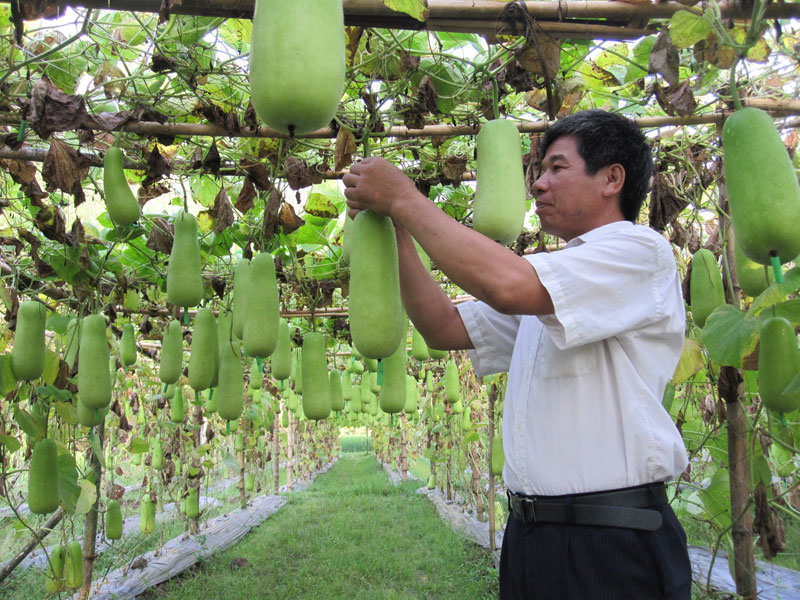
(HBO)-The veteran Vi Van Thin in Lau hamlet, Mai Ha commune is a good example who is doing business well.

The veteran Vi Van Thin in Lau hamlet, Mai Ha
commune (Mai Chau) is taking care of the garden of gourds for collecting.
Not resigning to poverty, Mr. Vi Van Thin
went around to learn about production experience in many places in the district
and in the province and started to plant forests, grow vegetables, combining
with livestock and poultry breeding. However, in the early time the income is
only average, temporarily enough for family living expenses. In 2010, he boldly
borrowed money from the bank along to invest in buying breeds, expanding
breeding facilities with the capital of his family. Additionally, he combined
planting forests, digging ponds to raise fish and raising chickens and growing
vegetables. After many years of persistence, exploring and learning in many
places, getting experiences, his economic development model has given a stable
income. Currently, his family has nearly 100 chickens, 12 pigs, 8 buffaloes and
many kinds of crops with high economic value. Each year his family exports two
litters of 2 chickens, 2 litters of pigs and 3 litters of gourds with the
income of about 250-300 million VND. Mr. Thin said "My family mainly develops
synthetic economy. After borrowing the budget, I have invested in developing
raising livestock, growing crops, digging fish ponds, building cages for pigs,
chickens and ducks and planting perennial trees. In the early days, when I
started to do business due to lack of experience, scientific and technical
knowledge to take care of crops so I thought I had to give up halfway.”
The will and energy of the soldier helped him
overcome the difficulties. He himself learned to apply scientific and
technological advances to animal husbandry and production so it brought high
economic efficiency. After many years, his family has built a comprehensive
economic model of gardens, ponds and stables with very high economic efficiency.
Not only trying to enrich his family, he also
helps other families with difficulties in trees, seedlings such as baby fish
and chicken, other kinds of seeds and so on. He also disseminates the way of
how to take care of plants. Thanks to the development of animal husbandry, his
family now has a spacious house and a stable income, all his children have
stable jobs.
Dao Village’s honey – a product certified with a 3-star OCOP (One Commune One Product) rating by Thong Nhat Agricultural Cooperative in Dao Village (Hoa Binh City) – is highly regarded by consumers for its quality, richness, and variety in packaging. The distinctively sweet taste of Dao Village’s honey leaves a lasting impression on anyone who has tried it.
In alignment with Project No. 07-DA/TU, issued by the Hoa Binh provincial Party Committee on November 1, 2021, Lac Thuy district has actively promoted investment and supported the sustainable development of its industrial and handicraft sectors during the 2021–2025 period. Alongside this, the district has remained committed to preserving and revitalising traditional craft villages.
Located in the northern part of Lac Thuy district, with a temperate climate and fertile soil, Phu Thanh commune has great potential and advantages in growing tea. The long-standing experience, combined with strict adherence to organic farming practices in the tea gardens, ensures that the dried tea products from Phu Thanh and Lac Thuy as a whole are sold out immediately upon production, providing a stable and prosperous life for the local people.
Amid efforts to streamline the administrative apparatus, Hoa Binh province has intensified measures to address challenges in land clearance, resettlement support, and infrastructure investment, aiming to speed up the progress of key projects.
Hoa Binh province has posted an unprecedented economic growth rate of 12.76% in the first quarter of 2025, marking its highest quarterly performance to date and positioning it as the second fastest-growing locality in the country, trailing only Bac Giang province.
Under current regulations, products in the One Commune – One Product (OCOP) programme that are rated three stars or higher must undergo re-evaluation every three months. However, in reality, some of these products fail to consistently meet the required standards, raising concerns about the sustainability of their OCOP certification. This underscores the urgent need for producers to enhance product quality and gradually develop their OCOP products into strong, marketable brands.



